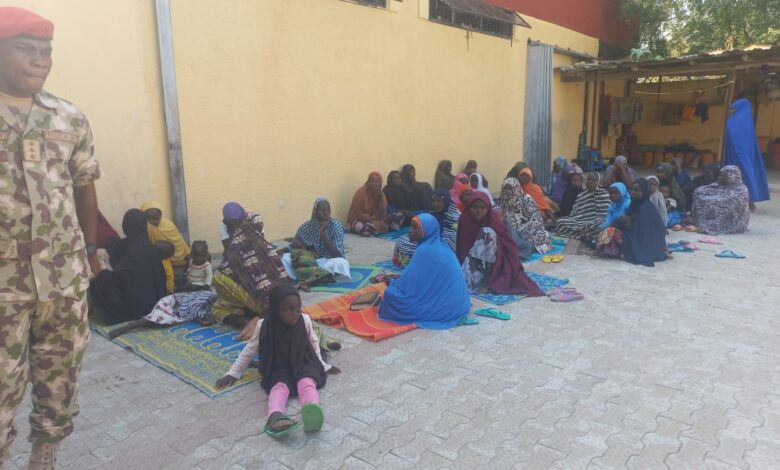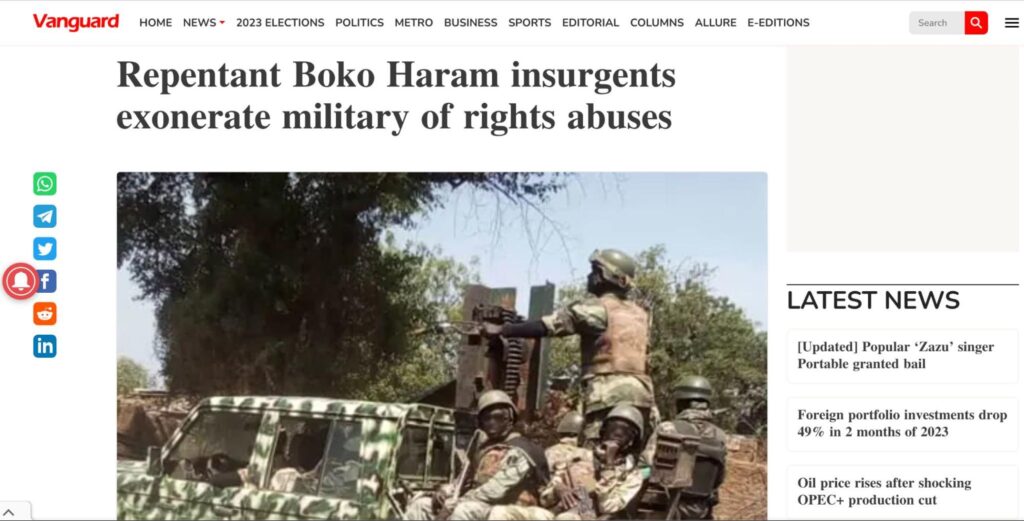Concerns After Human Rights Commission Say Ex-Boko Haram ‘Exonerated’ Soldiers Of Abortion Charges
The investigative panel probing an alleged mass abortion programme by the country’s military held a private hearing where three former Boko Haram fighters gave testimony. The National Human Rights Commission released a statement saying the men had “exonerated” soldiers.

Questions are being raised about the way Nigeria’s top human rights organisation is administering a panel set up to examine accusations the military ran a secret programme forcing women to abort pregnancies conceived during their captivity with Boko Haram.
The National Human Rights Commission has said testimony from three ex-Boko Haram Fighters to the investigation into the abortion program “exonerated soldiers”, long before the panel is expected to conclude taking evidence.
The statement, made in a press release, “puts the cart before the horse” and raises questions about the way the inquiry is being conducted, human rights activists say.
The NHRC made the statement when they released details of a behind-closed-door hearing of the panel investigating accusations abortions were forced on women by the military.
In the private hearing at a detention facility for repentant fighters on March 27, the panel heard from three men the NHRC said are former Boko Haram terrorists.
Last year, the news agency Reuters published a special investigation which reported the Nigerian military had carried out a decade-long, secret and illegal system of abortions, terminating pregnancies of at least 10,000 women and girls in the northeast.
Most of the women were captives of the terrorists and had been impregnated while in their clutches. The abortions were carried out in detention facilities, barracks and hospitals in Maiduguri.
There is a widespread belief that being a terrorist can be “in the blood”, and the children of women in this position would inevitably become terrorists themselves, the report said.
But there is nothing in the NHRC statement about the men’s testimony that suggests they could have been in a position to be first-hand witnesses to the abortion programme, as it was reported by Reuters.
Verbatim
The Special Independent Investigative Panel on Human Rights Violations in the Counter Insurgency Operations in the North East is still collecting evidence, and it is not thought it will be in a position to announce its findings for some time yet.
A spokesperson for the NHRC said that HumAngle had “misunderstood” the release, and their use of the word “exonerate” had been misinterpreted.
The statement issued by the NHRC was titled “Reuter’s Reports: 3 Ex-Boko Haram Fighters Loyal To Abubakar Shekau Exonerate Soldiers”.
The NHRC release does not give direct quotations from the men’s testimony. It says in words apparently written by an NHRC employee: “Their position is contrary to the allegation levelled by an international news agency.” It also says one detainee “exonerated officers and soldiers of any allegations of abortion”.
It was written up almost verbatim by several media organisations. One publication gave their report the headline “Repentant Boko Haram Insurgents Exonerate Military of Rights Abuses”.
Cart before horse
The statement from the NHRC has caused alarm among human rights activists and raised questions about the conduct of the inquiry.
“More questions are arising from this inquiry than answers,” said Aminu Hayatu, a human rights activist and conflict researcher. “We are facing a situation of putting the cart before the horse here”.

Serious questions should be asked about the panel’s methodology, he added.
There are also questions about why Boko Haram detainees would speak in defence of the military, and what they could possibly say conclusively about the Reuters allegations.
Researchers say there are circumstances where Ex Boko Haram fighters might be a good source of information. They can shed light on what happened to defectors from Boko Haram to the government side, says Vincent Foucher an academic from the National Centre for Science Research in Paris, who has spent years interviewing Boko Haram detainees.
“Of course a government-associated panel interviewing some guys chosen who knows how, might not be the best way to establish the truth,” he said.
It is unclear why these three men were chosen to give testimony out of hundreds of inmates at the detention facility visited by the panel.
Inmates at Bulumkutu Interim Care Centre have many privileges. They are able to leave the camp during the day and move around unmonitored. They are trusted to return at night. It is sometimes the last stop in detention before being released.
Mistake
Barrister Jummai Mshelia, who heads the Borno state office of the National Human Rights Commission, said she felt the use of the word “exonerate” was a mistake.
“Only the Chairman of the Panel, working with the members, has the power to exonerate anybody after they are done with the whole investigations and reviewing all submissions and testimonies of witnesses,” she said.
She was at the session at Bulumkutu camp where the testimony was heard on March 27, she said. The men testified they did not believe the military could do what the report said they had, she told HumAngle.
“Their argument was that it was the military who rescued their women and even took them to safe locations. So the word ‘exonerate’ did not really represent what they said during testimony.”
A spokeswoman for the NHRC also said the panel has not concluded investigations into the allegation by Reuters.
Fatima Agwai Mohammed said: “You have misunderstood us and I think it’s the interpretation of the word “exonerated” that is the problem. The fact remains that we have not concluded our sittings and we have not also passed judgement.
“We are still working and it will be unfair to insinuate that we are already passing judgement”
In the past, the NHRC has come under scrutiny. The panel is underfunded, Amnesty International has said, and lacks the authority and power to investigate issues properly.
“There have been several panels investigating allegations of violations by Nigeria’s military and other security agents, but there has been no meaningful accountability relating to impunity and atrocities by the military and Boko Haram,” Amnesty International said in a statement.
Earlier this year, a director at the NHRC also raised concerns they were not able to fully address their mandate.
They do not have the staff with the right skills, or the funding to properly address all of Nigeria’s Human Rights issues, Abdulrahman Yakubu, director of the Civil and Political Rights Department of the NHRC, told an audience at Amnesty International’s commemoration of World Social Justice Day in February.
Support Our Journalism
There are millions of ordinary people affected by conflict in Africa whose stories are missing in the mainstream media. HumAngle is determined to tell those challenging and under-reported stories, hoping that the people impacted by these conflicts will find the safety and security they deserve.
To ensure that we continue to provide public service coverage, we have a small favour to ask you. We want you to be part of our journalistic endeavour by contributing a token to us.
Your donation will further promote a robust, free, and independent media.
Donate HereStay Closer To The Stories That Matter




